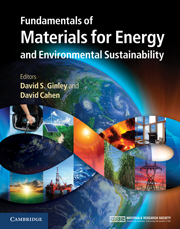Book contents
- Frontmatter
- Contents
- Contributors
- Preface
- Acknowledgments
- Part 1 Energy and the environment: the global landscape
- Part 2 Nonrenewable energy sources
- Part 3 Renewable energy sources
- 17 Solar energy overview
- 18 Direct solar energy conversion with photovoltaic devices
- 19 Future concepts for photovoltaic energy conversion
- 20 Concentrating and multijunction photovoltaics
- 21 Concentrating solar thermal power
- 22 Solar thermoelectrics: direct solar thermal energy conversion
- 23 Off-grid solar in the developing world
- 24 Principles of photosynthesis
- 25 Biofuels and biomaterials from microbes
- 26 Biofuels from cellulosic biomass via aqueous processing
- 27 Artificial photosynthesis for solar energy conversion
- 28 Engineering natural photosynthesis
- 29 Geothermal and ocean energy
- 30 Wind energy
- Part 4 Transportation
- Part 5 Energy efficiency
- Part 6 Energy storage, high-penetration renewables, and grid stabilization
- Summary
- Appendix A Thermodynamics
- Appendix B Electrochemistry
- Appendix C Units
- Index
- References
23 - Off-grid solar in the developing world
from Part 3 - Renewable energy sources
Published online by Cambridge University Press: 05 June 2012
- Frontmatter
- Contents
- Contributors
- Preface
- Acknowledgments
- Part 1 Energy and the environment: the global landscape
- Part 2 Nonrenewable energy sources
- Part 3 Renewable energy sources
- 17 Solar energy overview
- 18 Direct solar energy conversion with photovoltaic devices
- 19 Future concepts for photovoltaic energy conversion
- 20 Concentrating and multijunction photovoltaics
- 21 Concentrating solar thermal power
- 22 Solar thermoelectrics: direct solar thermal energy conversion
- 23 Off-grid solar in the developing world
- 24 Principles of photosynthesis
- 25 Biofuels and biomaterials from microbes
- 26 Biofuels from cellulosic biomass via aqueous processing
- 27 Artificial photosynthesis for solar energy conversion
- 28 Engineering natural photosynthesis
- 29 Geothermal and ocean energy
- 30 Wind energy
- Part 4 Transportation
- Part 5 Energy efficiency
- Part 6 Energy storage, high-penetration renewables, and grid stabilization
- Summary
- Appendix A Thermodynamics
- Appendix B Electrochemistry
- Appendix C Units
- Index
- References
Summary
Focus
This chapter introduces a wide array of sustainable approaches that use solar energy technology to address challenges faced by communities in developing regions of the world. Special emphasis is placed on how rural electrification efforts can provide communities with an off-grid power supply that can stimulate technological development through the improvement of a wide range of resources including infrastructure, health care, and education.
Synopsis
In many areas of the developing world, even basic energy access is still a privilege, not a right. Excessive demand from rapid urbanization often leads to unreliable electricity supplies in the urban areas. However, the problem is most acute in rural and nomadic communities, where lower population densities and income levels make it less practical to establish the necessary infrastructure to connect these communities to the electrical grids that power the cities and megacities. In this context, there is a growing need for innovative energy solutions tailored to the particular needs and demands of these communities, if wide-scale rural electrification that extends energy access to rural regions is to be possible.
- Type
- Chapter
- Information
- Publisher: Cambridge University PressPrint publication year: 2011



